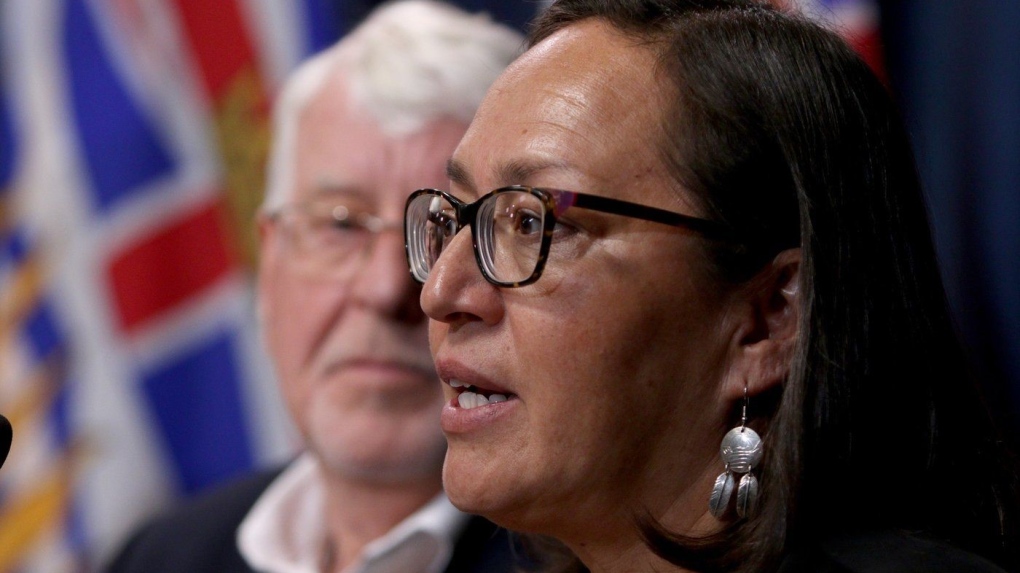First Nations women overrepresented among B.C. toxic drug deaths: doctor
 Dr. Nel Wieman with the First Nations Health Authority speaks about the illicit drug toxicity deaths in the province and about the effect on First Nation's communities during a press conference at B.C. Legislature in Victoria, B.C., on Monday, February 24, 2020. THE CANADIAN PRESS/Chad Hipolito
Dr. Nel Wieman with the First Nations Health Authority speaks about the illicit drug toxicity deaths in the province and about the effect on First Nation's communities during a press conference at B.C. Legislature in Victoria, B.C., on Monday, February 24, 2020. THE CANADIAN PRESS/Chad Hipolito
The top doctor at British Columbia's First Nations Health Authority says Indigenous people, especially women, are dying from toxic drugs at disproportionately high rates as the overdose crisis continues “unabated,” nearly seven years after the province first declared a public health emergency.
Dr. Nel Wieman, the acting chief medical officer, says illicit drugs are killing First Nations people at five times the rate of B.C.'s general population.
She says that figure rose to 8.8 per cent for First Nations women, specifically, compared with non-Indigenous women in the province in the first half of 2022.
That number contrasts with the overall toll for the province, which shows 79 per cent of those who died from toxic drugs last year were male.
Wieman's remarks came as B.C.'s chief coroner released data Tuesday showing suspected drug toxicity claimed 2,272 people last year, and as B.C.'s exemption to federal drug laws took effect, allowing adults to carry small amounts of certain illicit substances without fear of being arrested or having their drugs confiscated by police.
She says the underlying reasons for the increased impact of the toxic drug crisis on First Nations people in B.C. are “complex and varied,” including intergenerational trauma stemming from Canada's residential school system and the apprehension of Indigenous children for placement in government care, along with a lack of access to culturally safe mental health and substance use supports.
“There are also the impacts of ongoing events, including the discovery of the unmarked graves of children who attended residential schools, various climate change emergencies and the COVID-19 pandemic,” Wieman told a news conference where the annual statistics were released.
Substance use and mental health are closely linked, she said. People use substances to change how they feel, and the health authority's response to the crisis involves helping people develop healthier coping mechanisms while expanding harm reduction and treatment options rooted in Indigenous values and culture.
“We recognize that seeking treatment alone, in the standard western format, may not meet the needs of all First Nations people,” Wieman said.
“Offering treatment that's grounded in culture and ceremony addresses (that), addressing the underlying trauma will have a better longer-term outcome.”
Many people have died while using drugs alone, in private homes, where no one was around to call for help, Wieman noted.
“Stories have been shared with us of women who used substances privately, because of the fear they have of losing their children or personal supports.”
The illicit drug supply is “unpredictable and so incredibly dangerous that people risk their lives by accessing it even once,” Wieman said.
Chief coroner Lisa Lapointe said Tuesday that a range of measures are urgently needed to address the crisis,including expanded access to safe prescription alternatives, drug-checking services, overdose prevention sites and a “continuum of care” involving treatment, recovery and medical and mental health support options.
This report by The Canadian Press was first published Jan. 31, 2023.
CTVNews.ca Top Stories

'They needed people inside Air Canada:' Police announce arrests in Pearson gold heist
Police say one former and one current employee of Air Canada are among the nine suspects that are facing charges in connection with the gold heist at Pearson International Airport last year.
House admonishes ArriveCan contractor in rare parliamentary show of power
MPs enacted an extraordinary, rarely used parliamentary power on Wednesday, summonsing an ArriveCan contractor to appear before the House of Commons where he was admonished publicly and forced to provide answers to the questions MPs said he'd previously evaded.
Leafs star Auston Matthews finishes season with 69 goals
Auston Matthews won't be joining the NHL's 70-goal club this season.
Trump lawyers say Stormy Daniels refused subpoena outside a Brooklyn bar, papers left 'at her feet'
Donald Trump's legal team says it tried serving Stormy Daniels a subpoena as she arrived for an event at a bar in Brooklyn last month, but the porn actor, who is expected to be a witness at the former president's criminal trial, refused to take it and walked away.
Why drivers in Eastern Canada could see big gas price spikes, and other Canadians won't
Drivers in Eastern Canada face a big increase in gas prices because of various factors, especially the higher cost of the summer blend, industry analysts say.
Doug Ford calls on Ontario Speaker to reverse Queen's Park keffiyeh ban
Ontario Premier Doug Ford is calling on Speaker Ted Arnott to reverse a ban on keffiyehs at Queen's Park, describing the move as “needlessly” divisive.
'A living nightmare': Winnipeg woman sentenced following campaign of harassment against man after online date
A Winnipeg woman was sentenced to house arrest after a single date with a man she met online culminated in her harassing him for years, and spurred false allegations which resulted in the innocent man being arrested three times.
Woman who pressured boyfriend to kill his ex in 2000s granted absences from prison
A woman who pressured her boyfriend into killing his teenage ex more than a decade ago will be allowed to leave prison for weeks at a time.
Customers disappointed after email listing $60K Tim Hortons prize sent in error
Several Tim Horton’s customers are feeling great disappointment after being told by the company that an email stating they won a boat worth nearly $60,000 was sent in error.

































